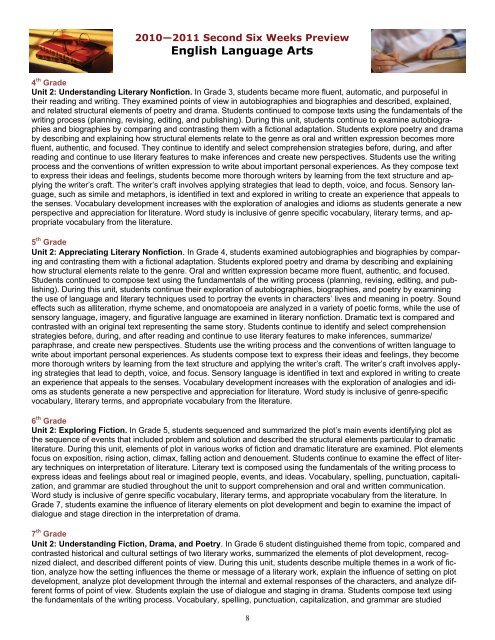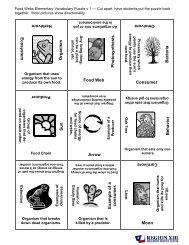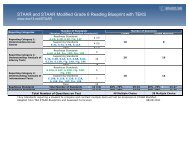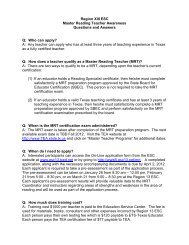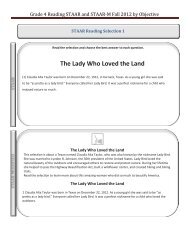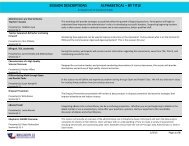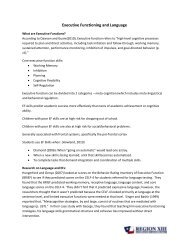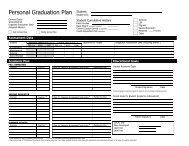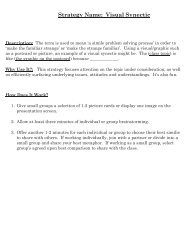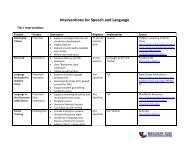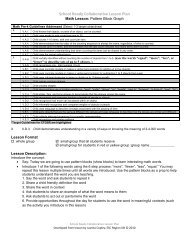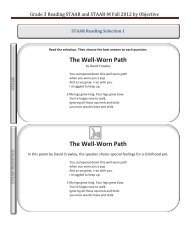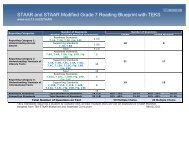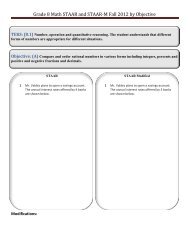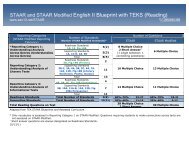2nd Six Weeks Newsletter - Region 13
2nd Six Weeks Newsletter - Region 13
2nd Six Weeks Newsletter - Region 13
Create successful ePaper yourself
Turn your PDF publications into a flip-book with our unique Google optimized e-Paper software.
2010—2011 Second <strong>Six</strong> <strong>Weeks</strong> PreviewEnglish Language Arts4 th GradeUnit 2: Understanding Literary Nonfiction. In Grade 3, students became more fluent, automatic, and purposeful intheir reading and writing. They examined points of view in autobiographies and biographies and described, explained,and related structural elements of poetry and drama. Students continued to compose texts using the fundamentals of thewriting process (planning, revising, editing, and publishing). During this unit, students continue to examine autobiographiesand biographies by comparing and contrasting them with a fictional adaptation. Students explore poetry and dramaby describing and explaining how structural elements relate to the genre as oral and written expression becomes morefluent, authentic, and focused. They continue to identify and select comprehension strategies before, during, and afterreading and continue to use literary features to make inferences and create new perspectives. Students use the writingprocess and the conventions of written expression to write about important personal experiences. As they compose textto express their ideas and feelings, students become more thorough writers by learning from the text structure and applyingthe writer’s craft. The writer’s craft involves applying strategies that lead to depth, voice, and focus. Sensory language,such as simile and metaphors, is identified in text and explored in writing to create an experience that appeals tothe senses. Vocabulary development increases with the exploration of analogies and idioms as students generate a newperspective and appreciation for literature. Word study is inclusive of genre specific vocabulary, literary terms, and appropriatevocabulary from the literature.5 th GradeUnit 2: Appreciating Literary Nonfiction. In Grade 4, students examined autobiographies and biographies by comparingand contrasting them with a fictional adaptation. Students explored poetry and drama by describing and explaininghow structural elements relate to the genre. Oral and written expression became more fluent, authentic, and focused.Students continued to compose text using the fundamentals of the writing process (planning, revising, editing, and publishing).During this unit, students continue their exploration of autobiographies, biographies, and poetry by examiningthe use of language and literary techniques used to portray the events in characters’ lives and meaning in poetry. Soundeffects such as alliteration, rhyme scheme, and onomatopoeia are analyzed in a variety of poetic forms, while the use ofsensory language, imagery, and figurative language are examined in literary nonfiction. Dramatic text is compared andcontrasted with an original text representing the same story. Students continue to identify and select comprehensionstrategies before, during, and after reading and continue to use literary features to make inferences, summarize/paraphrase, and create new perspectives. Students use the writing process and the conventions of written language towrite about important personal experiences. As students compose text to express their ideas and feelings, they becomemore thorough writers by learning from the text structure and applying the writer’s craft. The writer’s craft involves applyingstrategies that lead to depth, voice, and focus. Sensory language is identified in text and explored in writing to createan experience that appeals to the senses. Vocabulary development increases with the exploration of analogies and idiomsas students generate a new perspective and appreciation for literature. Word study is inclusive of genre-specificvocabulary, literary terms, and appropriate vocabulary from the literature.6 th GradeUnit 2: Exploring Fiction. In Grade 5, students sequenced and summarized the plot’s main events identifying plot asthe sequence of events that included problem and solution and described the structural elements particular to dramaticliterature. During this unit, elements of plot in various works of fiction and dramatic literature are examined. Plot elementsfocus on exposition, rising action, climax, falling action and denouement. Students continue to examine the effect of literarytechniques on interpretation of literature. Literary text is composed using the fundamentals of the writing process toexpress ideas and feelings about real or imagined people, events, and ideas. Vocabulary, spelling, punctuation, capitalization,and grammar are studied throughout the unit to support comprehension and oral and written communication.Word study is inclusive of genre specific vocabulary, literary terms, and appropriate vocabulary from the literature. InGrade 7, students examine the influence of literary elements on plot development and begin to examine the impact ofdialogue and stage direction in the interpretation of drama.7 th GradeUnit 2: Understanding Fiction, Drama, and Poetry. In Grade 6 student distinguished theme from topic, compared andcontrasted historical and cultural settings of two literary works, summarized the elements of plot development, recognizeddialect, and described different points of view. During this unit, students describe multiple themes in a work of fiction,analyze how the setting influences the theme or message of a literary work, explain the influence of setting on plotdevelopment, analyze plot development through the internal and external responses of the characters, and analyze differentforms of point of view. Students explain the use of dialogue and staging in drama. Students compose text usingthe fundamentals of the writing process. Vocabulary, spelling, punctuation, capitalization, and grammar are studied8


